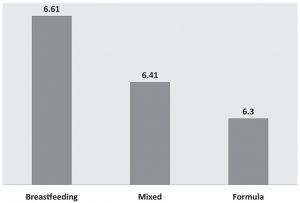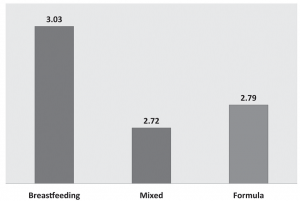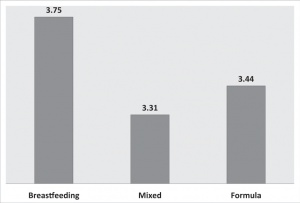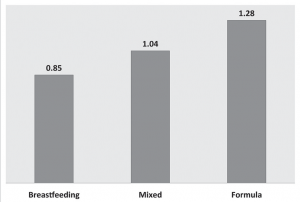October 19, 2011
Exclusively Breastfeeding Mothers Get More Sleep: Another Look at Nighttime Breastfeeding and Postpartum Depression
By: Kathleen Kendall-Tackett | 0 Comments
In a previous post, I described the results of recent studies that indicated that exclusively breastfeeding mothers appear to get more sleep than their mixed- and exclusively formula-feeding counterparts. That blog post generated quite a bit of comment. For many of us, the findings of these recent studies seemed completely counterintuitive - how could the breastfeeding mothers get more sleep? I have to admit, this research changed my mind. For years, like many breastfeeding researchers, I assumed that breastfeeding mothers got less sleep. But research over the past five years has proven that these assumptions were wrong.
In this post, I've summarized the findings from our study (Kendall-Tackett, Cong, & Hale, 2011). These findings were published in the journal Clinical Lactation. Our sample was 6410 mothers of babies 0-12 months old. The mothers ranged in age from 13-50 and they completed an online survey with 253 items that were all about their sleep patterns, infant sleep location, the mothers' physical and emotional health, their pregnancies and birth experiences, their trauma history, and detailed questions about how they feed their infants. For these analyses, we asked a summary question about feeding method: 'Since your baby was born, did you breastfeed, formula feed, or both breast and formula feed?' We then examined several indices of mothers' sleep and well-being. We found that on all measures, breastfeeding mothers reported significantly better functioning. They were getting more sleep, felt better during the day, and were less depressed. Interestingly, there was no significant difference between the mothers who were either mixed- or formula-feeding on any measure. This suggests a threshold effect for breastfeeding: that mothers who supplemented did not have the same physiological benefits as mothers who only breastfed. The babies, obviously, benefit from receiving their mothers' milk. But the mothers get more physiological benefits if they can breastfeed exclusively. Below is a summary of our findings.
Breastfeeding mothers reported sleeping significantly more hours. Two previous studies found that mothers' reported hours of sleep is a better predictor of lowered PPD risk than measures of mothers' 'actual' hours of sleep recorded via polysomnograph.

Figure 1. Number of hours mothers report that they sleep.
Consistent with getting more sleep, breastfeeding mothers reported more daily energy and better overall physical health.

Fig. 2: Mothers' Daily Energy on a Five-Point Scale
Consistent with previous studies, breastfeeding mothers also had lower risk for depression as measured on the PHQ-2.

Fig. 3: Mothers' Overall Rating of Their Physical Health

Fig. 4: Maternal depression
I would like to anticipate a couple of questions based on questions I received from the previous post. First, the breastfeeding mothers were not all bedsharing. In fact, they were pretty evenly divided between bedsharing and baby in a crib in another room. [Click here to read this article.] I suspect that these findings would be even stronger if we only included the bedsharing mothers. Second, many readers wondered whether we were trying to prove causation with correlation. We were not. We used analysis of variance to examine mean group differences. Consistent with our findings, we can report that, for example, breastfeeding mothers reported a significantly higher number of hours of nightly sleep.
The findings from our study are quite consistent with previous studies, and they suggest that when mothers start supplementing, that they actually get less sleep. So that strategy that her family, and many professionals, are likely to suggest (i.e., have someone else give the baby a bottle, or have the mother give the baby a bottle herself) could actually make things worse. In the next post, I will give some suggestions about what you can do to help a mother who is overly fatigued.
Reference
Kendall-Tackett, K. A., Cong, Z., & Hale, T. W. (2011). The effect of feeding method on sleep duration, maternal well-being, and postpartum depression. Clinical Lactation, 2(2), 22-26.
Posted by: Kathleen Kendall-Tackett,PhD, IBCLC, FAPA, is a health psychologist and board-certified lactation consultant. She is clinical associate professor of pediatrics at Texas Tech University Health Sciences Center in Amarillo, Texas. She is owner and editor-in-chief of Praeclarus Press, a small press specializing in women's health. She can be contacted at www.KathleenKendall-Tackett.com.
Tags
Postpartum depression Breastfeeding Postpartum Babies Kathleen Kendall-Tackett Breastfeeding And Depression Breastfeeding And Sleep Clinical Lactation Infant Nutrition Online Store Postpartum Mood Disorders Postpartum Sleep Issues Pros Of Breastfeeding